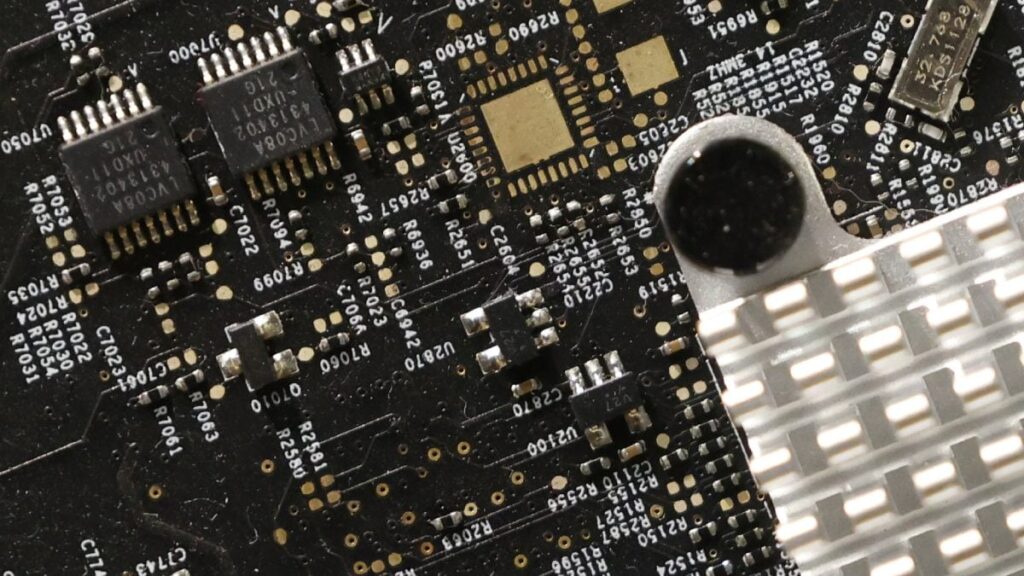Biden administration officials have discussed limiting sales of advanced AI chips from Nvidia and other U.S. companies on a country-by-country basis, people familiar with the matter said, a move that would limit some countries’ artificial intelligence (AI) capabilities.
The new approach would put a cap on export permits for certain countries in the interest of national security, according to the people, who described private conversations on condition of anonymity. Officials are focused on Gulf countries that have a growing appetite for AI data centers and the deep pockets to fund them, the people said.
Considerations are early and ongoing, the people said, noting that the idea has gained traction in recent weeks. The policy would be based on a new framework to ease the licensing process for the supply of AI chips to data centers in places like the United Arab Emirates and Saudi Arabia. Commerce Department officials unveiled the regulations last month and said new rules are coming.
The agency’s Office of Industry and Security, which oversees export controls, declined to comment. Nvidia, the market leader for AI chips, also declined to comment, as did Advanced Micro Devices. A representative of Intel, which also makes such processors, did not respond to a request for comment.
A spokesman for the White House National Security Council declined to comment on the talks, but pointed to a recent joint US-UAE statement on artificial intelligence. In it, the two countries acknowledged the “tremendous potential for good of artificial intelligence” as well as “the challenges and risks of this emerging technology and the vital importance of safeguards.”
Placing country-based restrictions would tighten restrictions originally aimed at China’s artificial intelligence (AI) ambitions, as Washington considers the security risks of AI development around the world. The Biden administration has already restricted shipments of AI chips to companies such as Nvidia and AMD in more than 40 countries across the Middle East, Africa and Asia over fears that their products could be diverted to China.
At the same time, some US officials have come to view semiconductor export licenses, particularly Nvidia chips, as a leverage point to achieve broader diplomatic goals. That could include asking key companies to cut ties with China to gain access to American technology — but concerns extend beyond Beijing.
“We will have to talk to countries around the world about how they plan to use these capabilities,” Tarun Chhabra, senior director of technology at the National Security Council, said at a forum in June without naming specific nations. “If you’re talking about countries that have a really robust internal surveillance apparatus, then we have to think about: How exactly are they going to use those capabilities to enhance that kind of surveillance, and what is that going to look like?”
There is also the question of how the global development of artificial intelligence could affect US intelligence operations, said Maher Bitar, another NSC official. “What are the risks not only on a human rights basis, but also in terms of security and counterintelligence risks to our personnel around the world?” said Bitar at the same event.
It is not clear how the leading AI chip makers would react to additional restrictions in the US. When the Biden administration first issued sweeping chip regulations for China, Nvidia redesigned its AI offerings to ensure it could continue to sell in that market.
If the administration moves forward with state-by-state restrictions, it could prove difficult to enact a comprehensive new policy in the final months of President Joe Biden’s term. Such rules could be challenging to implement and would be a major test of US diplomatic relations.
Governments around the world are seeking so-called sovereign artificial intelligence — the ability to build and run their own artificial intelligence systems — and that quest has become a key driver of demand for advanced processors, according to Nvidia CEO Jensen Huang. Nvidia’s chips are the gold standard for data center operators, making the company the world’s most valuable chip maker and the biggest beneficiary of the AI boom.
China, meanwhile, is working to develop its own advanced semiconductors, although they still lag behind the best American chips. However, there is concern among US officials that if Huawei Technologies Co. or another foreign manufacturer one day offers a viable alternative to Nvidia’s chips—perhaps with fewer strings attached—it could weaken the U.S.’s ability to shape the global AI landscape.
Some US officials argue that this is only a distant possibility and that Washington should adopt a more restrictive approach to global exports of AI chips given the current negotiating position. Others warn against making it difficult for other countries to buy American technology, in case China wins and captures those buyers.
While officials debated the best approach, they slowed approvals of large volumes of licenses for AI chips in the Middle East and elsewhere. But there are signs things could soon pick up: Under new data center shipping rules, US officials will vet and pre-approve certain buyers based on security commitments from both the companies and their national governments, paving the way for easier licensing. .
© 2024 Bloomberg LP


